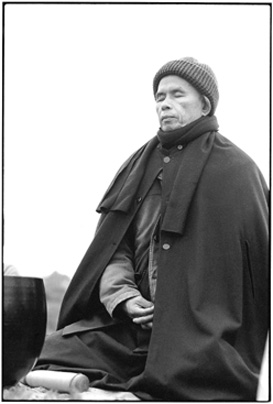Thich Nhat Hanh Reflects on Working Toward Peace
 Since
I was a young man, I've tried to understand the nature of
compassion. But what little compassion I've learned has
come not from intellectual investigation but from my actual
experience of
Since
I was a young man, I've tried to understand the nature of
compassion. But what little compassion I've learned has
come not from intellectual investigation but from my actual
experience of
suffering. I am not proud of my suffering any more than
a person who mistakes a rope for a snake is proud of his
fright. My suffering has been a mere rope, a mere drop of
emptiness so insignificant that it should dissolve like
mist at dawn. But it has not dissolved, and I am almost
unable to bear it. Doesn't the Buddha see my suffering?
How can he smile? Love seeks a manifestation-romantic love,
motherly love, patriotic love,
love for humanity, love for all beings. When you love someone,
you feel anxious for him or her and want them to be safe
and nearby. You cannot simply put your loved ones out of
your thoughts. When the Buddha
witnesses the endless suffering of living beings, he must
feel deep concern. How can he just sit there and smile?
But think about it. It is we who sculpt him sitting and
smiling, and we do it for a reason. When you stay up all
night worrying about your loved one, you are so attached
to the phenomenal world that you may not be able to see
the true face of reality. A physician who accurately understands
her patient's condition does not sit and obsess over a thousand
different explanations or anxieties as the patient's family
might. The doctor knows that the patient
will recover, and so she may smile even while the patient
is still sick.
Her smile is not unkind; it is simply the smile of one who
grasps the
situation and does not engage in unnecessary worry. How
can I put
into words the true nature of Great Compassion, mahakaruna?
When we begin to see that black mud and white snow are neither
ugly nor beautiful, when we can see them without discrimination
or duality, then we begin to grasp Great Compassion. In
the eyes of Great Compassion, there is neither left nor
right, friend nor enemy, close nor far. Don't think that
Great Compassion is lifeless. The energy of Great Compassion
is radiant and wondrous. In the eyes of Great Compassion,
there is no separation between subject and object, no separate
self. Nothing that can disturb Great Compassion.
If a cruel and violent person disembowels you, you can smile
and look at him with love. It is his upbringing, his situation,
and his ignorance that cause him to act so mindlessly. Look
at him-the one who is bent on your destruction and heaps
injustice upon you-with eyes of love and compassion. Let
compassion pour from your eyes and don't let a ripple of
blame or anger rise up in your heart. He commits senseless
crimes against you and makes you suffer because he cannot
see the way to peace, joy, or understanding.
If some day you receive news that I have died because of
someone's cruel actions, know that I died with my heart
at peace. Know that in my last moments I did not succumb
to anger. We must never hate another being. If you can give
rise to this awareness, you will be able to smile. Remembering
me, you will continue on your path. You will have a refuge
that no one can take from you. No one will be able to disturb
your faith, because that faith does not rely on anything
in the phenomenal world. Faith and love are one and can
only emerge when you penetrate deeply the empty nature of
the phenomenal world, when you can see that you are in everything
and everything is in you.
Long ago I read a story about a monk who felt no anger toward
the cruel king who had chopped off the monk's ear and pierced
his skin with a knife. When I read that, I thought the monk
must be some kind of god. That was because I did not yet
know the nature of Great Compassion. The monk had no anger
to hold back. All he had was a heart of love. There is nothing
to prevent us from being like that monk. Love teaches that
we can all live like the Buddha.
A Note From Photographer Michael Collopy
I was invited to meditate with Thây (which means
teacher in Vietnamese) at 5:30 a.m. one September morning
in Santa Barbara, California. We walked, pausing to hear
bells in the distance, aware of each breath, each step,
each sound of the waves crashing against the nearby coastline.
Our eyes would meet occasionally, and I was struck with
his piercing, gentle, childlike gaze-full of curiosity and
wonder at the expanse of sky, sea, and sand around us.
Biography
Resources for Teachers
and Students